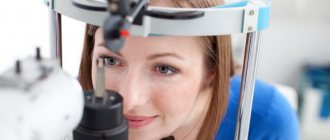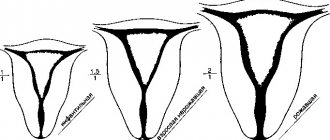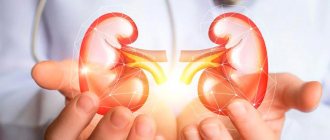An andrologist is a doctor who examines and treats only male patients. The name of this medical specialty comes from the Greek word “andros”, meaning “man”. The andrologist is in charge of the health of the male genitourinary system, as well as sexual and reproductive functions.
Pediatric andrologists see minor patients. From the age of 18 you should make an appointment with an andrologist for adults.
Where is the best place to go when you need a male andrologist?
To get a consultation with an andrologist, you must contact one of the following medical institutions:
- diagnostic center;
- multidisciplinary clinic;
- specialized clinic for male urology and andrology;
- inpatient hospital.
Diagnostic center or multidisciplinary clinic - for prevention
These options are ideal for those who need a consultation with an andrologist for prevention. When nothing bothers you, but you want to check if everything is okay. In such cases, it is quite enough to pass basic tests and undergo an ultrasound. Even if all indicators are normal, it is advisable to undergo such diagnostics approximately once a year.
Specialized clinic for male urology and andrology - for outpatient treatment
This option is for those who have symptoms (pain, discharge, problems with potency and/or ejaculation, frequent urination, infertility). Such clinics have everything necessary to carry out full diagnostics and comprehensive treatment:
- In case of acute pain, emergency assistance can be provided here.
- For chronic conditions, a course of therapy will be offered using the most modern hardware treatment methods.
Inpatient hospital - for hospitalization
You just can't get here. They are either sent by doctors from polyclinics and specialized clinics, or brought by ambulance paramedics.
Inpatient treatment is indicated for those who need:
- under 24-hour medical supervision,
- or in surgery.
Cost of services
The cost of treatment by an andrologist at the Medial clinic is calculated individually, taking into account the specific clinical situation. Our patients are always satisfied with the service and effectiveness of treatment. We use the latest technologies and equipment for diagnosis and therapy. Experienced specialists work here who constantly improve their skills and value their reputation. The multidisciplinary medical clinic “Medial” has the most affordable prices, favorable promotions and the opportunity to get an interest-free loan. If you are concerned about any suspicious symptoms and need advice from real professionals, call us and make an appointment.
Groups of diseases in outpatient andrology
- Inflammation of the internal and/or external genital organs (prostatitis, epididymitis, orchitis, vesiculitis, urethritis, cystitis, etc.).
- Infectious diseases, including sexually transmitted infections.
- Diseases caused by hormonal disorders - a lack or excess of male hormones.
- Benign tumors (prostate adenoma).
- Infertility.
- Decreased libido, weakened potency.
What is the competence of a urologist?
Men can contact a urologist for treatment:
- Developing prostatitis;
- Erectile dysfunction;
- Sexually transmitted diseases;
- Urethritis;
- Diseases of the kidneys, ureters, cystitis;
- Urolithiasis.
A urologist with surgical specialization also has the right to:
- Perform circumcision of the foreskin;
- Remove benign tumors, condylomas, and foreign bodies from the urethra from the penis;
- If necessary, perform frenuloplasty.
Return to content ^
Symptoms that require consultation with an andrologist
You should definitely make an appointment with a male andrologist if you are concerned about the following problems and symptoms :
Pain in the lower abdomen in men
Pain, burning in the genitals in men
Discharge from the genital organs in men
Pathological (requiring treatment) discharges are: - mucous, watery or purulent; - odorless or odorless; - transparent, white, yellow, etc.; - with streaks of blood or bloody clots; - can come out only after urination or independently of it.
Problems with urination
Acute pain in the male genital organs
They occur in the groin, penis, testicles, lower abdomen, prostate area during urination, during or after sexual intercourse, during any physical activity - be it normal walking, bending, lifting heavy objects or intense sports. The pain may flare up suddenly while you're at rest or wake you up while you sleep. Such pain usually goes away within a few minutes after its onset. They are more characteristic of the acute phase of diseases - inflammatory or infectious.
Aching pain in the groin area in men (inside and/or outside)
Experts usually call such conditions “chronic pain syndrome.” As the term implies, they usually indicate the presence of chronic problems. Pain can have varying degrees of severity - from barely noticeable to unbearable. They occur frequently, for no apparent reason, and can become almost permanent. If you are used to drowning them out with painkillers, then sooner or later they may stop helping, as the disease itself continues to progress. Pain usually occurs during urination, during erection or ejaculation, or after it. May be accompanied by frequent urination, bloody or mucous discharge. If the pain is accompanied by acute urinary retention or intestinal obstruction, this is a reason to call an ambulance.
Decreased libido in men (weakened sexual desire)
The most common cause is hormonal changes, in particular a decrease in the level of the male hormone testosterone or an increase in the level of female hormones.
Change in urination pattern
Various variations are possible, for example: - weakening of urine pressure; - the need to push to start urinating; - thin stream of urine; - splitting of the stream (it can cause urine to splash in different directions); - slow rate of urination; - intermittent urination; - urine output in separate drops.
Frequent urination
As practice shows, many men consider this to be normal. Some perceive this as age-related changes, others explain it by drinking a lot of fluid. Still others convince themselves that it is a cold that will soon go away on its own. In fact, frequent trips to the toilet can be considered the norm only if the problem disappears on its own within 24 hours. If it hasn’t passed within a day, this is a serious reason to undergo a urological examination as quickly as possible. This is how stage 2 prostate adenoma can manifest itself - it can be cured without surgery (at stage 3, surgical intervention is usually required).
Weakness or absence of erection
There are only 5 main reasons identified by urologists: 1. Hormonal imbalance - a decrease in the level of male hormones, an increase in the amount of female hormones. 2. Infections - sexually transmitted diseases, or infections that are “dormant” in the body, awakening under certain conditions. 3. Inflammation - prostatitis, epididymitis, urethritis, vesiculitis, cystitis and others. 4. Vascular problems - partial or complete blockage of the vessels of the penis due to the formation of atherosclerotic plaques. 5. Neurological problems - various diseases of the spine (especially the lumbar and lumbosacral regions) and the nervous system.
Regardless of the presence or absence of complaints, every man should be regularly examined by an andrologist, especially after the age of 40.
When planning a natural pregnancy, a preliminary consultation with a specialist is also advisable.
What are the names of the diseases that the doctor treats?
You should contact an andrologist if: prostate adenoma (prostate tissue grows, causing discomfort, pain and disrupting the functions of the prostate gland), prostatitis (pathological inflammatory process of the prostate), varicocele (a disease manifested by varicose veins in the testicles, thereby affecting the quality of sperm and can cause infertility), phimosis (a pathological phenomenon, accompanied by a narrowing of the ring on the side of the foreskin, which makes it difficult to remove the head from the penis), metabolic syndrome (the syndrome is accompanied by a whole complex of pathologies that have developed due to metabolic disorders and lack of production of testosterone and other hormones), menopause in men (the disease occurs and progresses as a result of disruption of the production of hormones responsible for stimulation of the testicles).
Pathologies and disorders that are examined and treated by an andrologist:
- sexually transmitted diseases (hepatitis, HIV infection, gonorrhea, syphilis, ureaplasmosis, genital herpes, candidiasis);
- male infertility (regardless of the reasons that provoked the development of the disease);
- oncology of the penis and testicles;
- sexual dysfunction (the doctor examines the psychological and physiological components of the disease);
- lack or excess production of male hormones;
- pathologies that are treated by androgenital surgery (elimination of external and internal defects of the genitals);
- menopause (age-related aging of the body, causing diseases of the genitourinary system, heart and blood vessels).
Only a qualified specialist will be able to determine the disease based on research and diagnostic data and prescribe prompt and effective treatment.
At the andrologist's appointment
An appointment with a male andrologist takes place in several stages.
The first stage is communication. The doctor will listen to all complaints and ask the necessary questions.
The second stage is an examination of the genital organs and prostate gland. The latter is examined through the rectum using palpation.
The third stage is diagnosis. The doctor gives a referral for tests and a referral to undergo the necessary tests and examinations.
The fourth stage is the appointment of therapy. After receiving the tests, the doctor develops a treatment regimen and recommends it to the patient.
The fifth stage is preventive work.
After treatment, the doctor will tell you in detail about methods of preventing this disease in order to avoid relapses.
How to prepare for your appointment
A consultation with an andrologist begins with a survey of the patient, so it is important to formulate information about disturbing symptoms in advance and be prepared to answer questions about the quality of sexual life and the partner.
Two days before your appointment, you should not have sexual intercourse, and immediately before visiting the doctor, it is advisable to empty your bowels naturally or with a cleansing enema. To avoid unpleasant moments, you should take care of personal hygiene and change your underwear.
Diagnosis by an andrologist
A modern andrologist has a large number of diagnostic methods in his arsenal: from laboratory to instrumental. This:
- blood and urine tests;
- analysis of a smear from the urethra (detects inflammation and its causative agent);
- spermogram (determines the ability of sperm to fertilize, identifies urological diseases, hormonal disorders, infections);
- ultrasound examination of the pelvic organs;
- Dopplerography of the vessels of the genitourinary system;
- biochemical screening;
- blood test to determine prostate specific antigen;
- hormone tests;
- endoscopy;
- uroflowmetry (method for determining the rate of urination);
- rheofallography (used for erectile dysfunction, measures the resistance of the blood vessels of the penis).
In some cases, computed or magnetic resonance imaging, x-ray examination, and vasography are performed.
After the research, therapy is prescribed and the necessary treatment methods are selected.
Spermogram
Since the andrologist is a male specialist, and some representatives suffer from erectile dysfunction, it is important to understand which doctor is taking the spermogram. Actually, if there is such a need, there are several options that would be most appropriate to turn to.
Answering the question: a spermogram doctor, as they call it, it must be said that there is no clear definition. Often such a diagnosis is prescribed by a urologist or andrologist. The presented specialist will determine the main indications and indicate to the laboratory technician the necessary parameters that need to be indicated in the results.
Spermogram
Also, sometimes the question arises which doctor interprets the spermogram. Here we can name three specialists: a reproductologist, an andrologist and a urologist. However, decoding is often done by the person who ordered the analysis.
A man does not need to be afraid if his gynecologist has prescribed a spermogram. This specialist examines women, but, for example, with the problem of infertility, if there is no female factor, you need to check the condition and quality of the husband’s sperm; perhaps the lack of conception is his fault.
Treatment methods
When developing a course of treatment, the doctor relies on two factors: Complexity and Individual approach. The selection of methods is directly related to the specifics of the identified disease. Treatment can be either conservative or surgical.
Treatment without surgery
- Drug therapy
- antifungal drugs (prescribed if the source of the problem is a fungus);
- anti-inflammatory drugs;
- painkillers;
- hormone replacement therapy.
- Physiotherapy:
- shock wave therapy (SWT);
- magnetic therapy;
- laser therapy;
- hardware vacuum massage of the genital organs;
- prostate massage;
- ozone therapy and many others.
Additionally the following may be recommended:
- correction of nutrition and lifestyle;
- physiotherapy;
- psychotherapy.
Surgical methods
Various operations are indicated only when conservative therapy is obviously ineffective, for example, for problems such as:
- congenital pathologies in the structure of the genital organs,
- malignant tumors,
- genital injuries,
- the presence of phimosis, recurrent balanitis, varicocele,
- acute urinary retention.
In all other cases, it is recommended to start with non-surgical methods. And only if they are completely ineffective, make a decision about surgery.
What does a urologist do?
A urologist (more about a urologist) is a medical specialist who treats and diagnoses the following diseases in the human genitourinary system:
- prostatitis (inflammation of the prostate or prostate gland) - usually caused by bacteria;
- urethritis (inflammatory process in the urethra);
- decreased erectile function and male libido;
- urolithiasis (determined by the presence of stones in the kidneys and ureter);
- sexually transmitted diseases (sexually transmitted);
- diseases in the kidneys and bladder associated with inflammation;
- genital infections.
Practicing urologists also perform surgeries in the following situations:
- circumcision of the penis;
- removal of foreign bodies from the genital organs;
- removal of a benign tumor.
Specializations of urologists-andrologists
The profession of andrologist also involves a number of even narrower specializations:
- Pediatric andrologist - corrects congenital pathologies, supervises the problems of sex education
- Andrologist-endocrinologist. His field of activity includes pathologies associated with disruption of the glands
- Andrologist-oncologist - diagnoses and treats tumors of the male genitourinary system.
- Andrologist-reproductologist. Fights infertility.
- Andrologist-surgeon. Performs surgeries to restore lost sexual function, eliminates cosmetic defects, and performs genital plastic surgery and castration.
- Andrologist-sexologist. Deals with potency disorders caused by the patient’s mental characteristics.
In what cases do you consult an andrologist?
A man can get a consultation with an andrologist:
- In a childless marriage;
- With the development of conditions characterized by loss of sexual desire, decreased genital tone, underdevelopment of the genital organs, impaired potency;
- If necessary, obtain information about methods of contraception, measures to prevent sexually transmitted diseases, and the characteristics of sexual intercourse during the wife’s pregnancy;
- When symptoms appear that indicate inflammatory and infectious diseases of the genital area.
Return to content ^
Andrologists' recommendations for men's health
- Move and exercise. This will allow your body to remain young as long as possible and will also prevent congestion in the prostate gland.
- Eat right, give up bad habits.
- Avoid hypothermia and overheating, strong vibrations and squeezing. All these phenomena contribute to the development of diseases.
- Once a year, undergo an examination by an andrologist, urologist, and venereologist.
- Do not self-medicate. For any symptoms related to the functioning of the kidneys, penis, urethra, testicles and their appendages, ureters, urethra, immediately contact a specialist (a public clinic or a paid andrologist). This visit will help stop the development of the disease and prevent the disease from entering the chronic stage.
In what cases do you consult a urologist?
Men can contact a urologist if they are concerned about:
- Impaired urination - pain, urinary retention or, conversely, incontinence;
- Pain in the lumbar region, which may be a sign of kidney disease;
- Presence of blood or pus in the urine;
- Discharge from the penis of a different nature;
- Problem with conception;
- Imbalance in sexual life.
You should contact a urologist not only when obvious health problems appear.
Regular preventive examinations will help to avoid serious diseases, some of which develop impotence and disrupt the functioning of the prostate gland.
Return to content ^
How to choose a male andrologist
Of course, it is impossible to determine unambiguously which andrologist is the best. However, it is worth considering that the professionalism of any specialist in the field of medicine is determined primarily by the depth of knowledge and breadth of practical experience.
Therefore, the ideal option in this case is to consult a doctor who specializes in working only with men . After all, he faces the most complex diseases of the male reproductive system every day.
Urologists who see both men and women may, in some cases, not have adequate experience in the field of andrology. Be sure to check whether the doctor you choose is a specialist in the treatment of male genitourinary diseases.
Paid or free?
You can find a good andrologist both in government institutions and in paid clinics.
However, paid medicine provides many more opportunities for providing high-quality medical services. An andrologist at a paid center can pay attention to every detail and conduct a thorough diagnosis.
In addition, in private clinics, unlike municipal ones, andrologist services are provided without queues, which will save not only your time, but also your nerves.
The next point is analyzes and research. Many paid clinics have the most modern equipment - both for diagnosis and treatment.
What does an andrologist-endocrinologist treat?
Diseases of the endocrine system in men, in this case a decrease in the production of the hormone testosterone by the male gonads and testicles, can lead to:
- infertility;
- deviations during puberty;
- obesity;
- sexual dysfunction.
Hypogonadism (lack of testosterone) can be primary, secondary, congenital or acquired. All these deviations are dealt with by an andrologist and endocrinologist.
Visit the andrology website to learn more about the symptoms, development and treatment of diseases of the male reproductive organs. Prices for andrologist services and a telephone number for making an appointment are also presented there.
Ask a Question
Still, it's not the same thing
Both of these medical specializations deal with men's health, but treat various diseases, and through joint efforts help a man maintain health and sexual activity for many years, and even delay the aging of the male body.
If problems arise with the genitourinary system, men should consult a doctor. But which one - a urologist or an andrologist? What is the difference between these specialties? To understand this issue, you need to find out what each of these doctors treats.
Urologist and andrologist treat both adult diseases and childhood pathologies
Difference between the two specialties
What is the difference between a urologist and an andrologist? Urology is a medical specialty that deals with the diagnosis and treatment of childhood and adult diseases of the genitourinary system (both men and women). One of the specializations of urology is andrology. It is aimed at treating the reproductive system, restoring the reproductive and erectile functions of men. An andrologist, like a urologist, treats both adult diseases and childhood pathologies associated with abnormal development of the genital organs.
If two of these specialists work in the clinic at once, then the difference in their functions will be as follows: the urologist undertakes the diagnosis and treatment of only diseases of the urinary system, and the andrologist treats diseases of the reproductive system. If the clinic does not have a full-time andrologist, then a urologist takes over his functions.
History of the development of specialties
The profession of urologist in its modern understanding began to take shape in our country at the beginning of the 19th century. But it was only a part of surgery and was not separated into a separate area. Urology became a separate discipline only in 1922. Gradually, along with surgical methods, conservative methods of treating adult and childhood diseases of the genitourinary system began to develop.
For many years, andrology was present only in theoretical form as one of the optional medical disciplines (even doctors were called by a double name - urologist-andrologist). As a separate medical specialty, andology began to take shape only at the end of the last century, so it should not be surprising that in many clinics to this day there is no doctor who would have a narrow specialization in the field of pathologies and diseases of the male reproductive system.
Andrologist's specialization is pathology and diseases of the male reproductive system
Diagnosis and therapy of patients
General clinical methods for examining patients between urologists and andrologists do not differ:
- Questioning: the purpose of the conversation with the patient is to identify important details of the medical history and the patient’s lifestyle, which could provoke the development of the disease. Some clinics provide online consultation services.
- Visual examination: attention is paid to the general appearance of the patient (skin condition, swelling, gait, posture), as well as to the condition of the external genitalia (the presence of any abnormalities).
- Macroscopic examination of urine to determine inflammatory processes in the body.
- Spermogram and urethral smear.
- Palpation of the anterior abdominal wall, penis, scrotal organs, iliac, paraarthal and paracaval lymph nodes, prostate gland.
- Laboratory tests: analysis of prostate secretions, biochemical blood test, renal function tests.
- Instrumental studies: catheterization, bougienage, biopsy, cystomanometry, uroflowmetry, urethroscopy.
- X-ray examination of the urinary and reproductive system.
- Radioisotope renangiography and ultrasound research methods.
Laboratory tests are carried out for both medical specializations
After all measures have been taken to establish an accurate diagnosis and identify the causes of the disease, the doctor will draw up a course of treatment for the disease. There is also no difference in treatment between an andrologist and a urologist. The patient can be treated with medications, physiotherapeutic techniques, and by adjusting diet and lifestyle. In severe cases, the disease will need to be treated through surgery.









